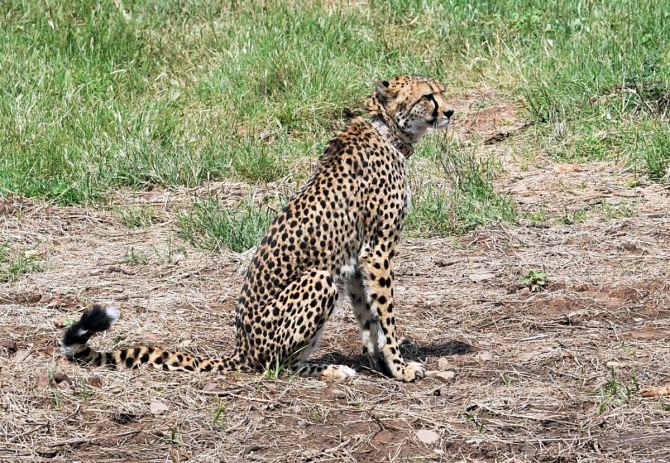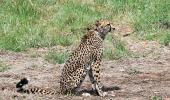After months of delay, a dozen wild cheetahs from South Africa will finally arrive on Saturday in Madhya Pradesh's Kuno National Park, where eight such felines were brought from Namibia last year, a wildlife expert associated with India's cheetah revival project said on Monday.

These big cats -- seven males and five females -- will embark on journey to their new home thousands of miles away aboard an Indian Air Force transport aircraft from the OR Tambo International Airport, Gauteng, South Africa on Friday evening, the project participant and expert told PTI.
He said the South African cheetahs will first arrive at the Gwalior Air Force base in MP on Saturday morning and 30 minutes later they will be transported some 165km away to KNP in Sheopur district by IAF helicopters.
After landing at KNP around noon, they will be put into quarantine bomas (enclosures) after half an hour (12.30 pm), added the expert.
KNP director Uttam Sharma said they have set up 10 quarantine bomas for South African cheetahs. In two of these facilities, two pairs of cheetah brothers would be kept.
"We have completed our preparations to receive the big cats on Saturday," he added.
Experts said a delegation from South Africa visited KNP in early September last year to see arrangements at the wildlife sanctuary for housing the world's fastest land animals.
A Memorandum of Understanding (MoU) was signed between India and South Africa last month for the translocation of the mammals last month.
South Africa has donated these big cats to India. But India has to pay USD 3,000 for the capture of every cheetah to the African nation before they are translocated, said the wildlife expert.
India had planned to airlift these South African cheetahs in August last year but couldn't do so due to delay in signing a formal translocation agreement between the two countries.
Due to the delay in the MoU signing for the inter-continental translocation of these big cats, some experts had in December expressed concern over the health of the South African cheetahs as these animals have been quarantined in their home country since July 15 in anticipation of their transfer to India.
As a result of long quarantine, these animals might have lost their fitness, they had said.
Prolonged quarantine could be taking a toll on the health of these felines, who are slated to join the eight cheetahs imported from Namibia and released into KNP in mid-September, the experts had said.
In fact, the 12 South African cheetahs earmarked for India have not hunted for themselves after being kept in bomas, wildlife experts in the know of India's cheetah reintroduction plan had said.
Three of them have been kept in Phinda quarantine boma in KwaZulu-Natal Province and nine in Rooiberg Quarantine boma in Limpopo Province, they said.
Seven of the cheetahs have lost fitness to a considerable extent as they have not hunted even once since July 15, one of the experts told PTI last month.
Prime Minister Narendra Modi, on his 72nd birthday on September 17, had released eight cheetahs flown in from Namibia into KNP amid a lot of fanfare, setting the ball rolling for the revival of their population in India where these distinctively spotted cat species became extinct seven decades ago.
These fastest land animals from Namibia – five females and three males – are currently in hunting enclosures at the park before their full release into the wild.
In August, the SA cheetahs selected by Indian officials for translocation had completed one-month in quarantine, but they couldn't be airlifted to KNP in absence of approval from the South African government.
Around Independence Day, the eight Namibian cheetahs had not completed their quarantine period so the Indian government could not bring them to KNP as well, the experts said.
As per Indian wildlife laws, a month-long quarantine is mandatory before importing animals and they are required to be kept in isolation for another 30 days after arrival in the country.
The experts said the spotted animals' metapopulation (cheetah count in small and medium parks) in South Africa has risen to 504 from 217 in 2011.
The last cheetah died in India in Koriya district of present-day Chhattisgarh in 1947 and the species was declared extinct in 1952.
Former Union Environment Minister Jairam Ramesh had initiated 'Project Cheetah' in 2009 under the United Progressive Alliance government with an aim to reintroduce the wild cats in India.










 © 2025
© 2025